Second Quarter 2008

by Edmund Chilaka
A community of artisanal sand miners at Ebute Ilaje in Bariga local government of Lagos State in Nigeria is famed for sand mining from the Lagos lagoon. This is a trade that, according to the present generation of sand miners called Ifesowaso Associates, started in the 1960s. Here, sand of three varieties are available on demand and in any desired quantity. The Ifesowaso Associates produce sharp sand, soft sand, and filling sand, all from the lagoon, but not at all from the immediate shoreline. DDH Magazine had to make a special trip to the Third Mainland Bridge in Lagos on a set time of day in order to catch a flotilla of these boatmen sailing in from far offshore. The secretary of the association, Mr James Aireomiye, maintains that their burrow pit, if it can be called that name, is about twenty kilometers from the shoreline at Ebute Ilaje. This will be somewhere around Egbin in Ikorodu or nearer to Epe.
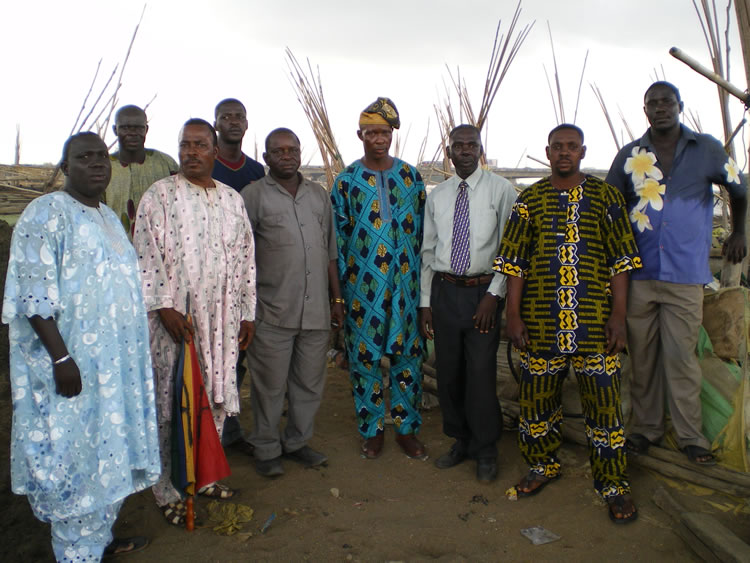
Many things are peculiar to these sand-miners. Conspicuously, western technology is scarce in their trade. The canoes are constructed locally, in fact, within the community, as we saw many types at various stages of construction or repair. Secondly, these canoe men do not use any form of power generation at all. The canoes are not equipped with any outboard engines at all. It is a wonder that all the canoes in sight, more than two hundred, are of this type – no outboard engines. They use sails made from locally available plastic tensile material, the rubberized type commonly made into sacks for grains storage or used in flex banner printing. Now, these are woven together and seamed in such a way that it is able to collect sea breeze and push the canoes. With this technology, they sail the very long mileage offshore for sand mining. Average sailing time to reach sand-digging spots, according to them, is about five hours of rowing and sailing. The use of sail accounts largely for the overflow of bamboo poles which fill the atmosphere of this beach. The other basic equipment in each canoe is a wooden ladder which is used to climb down and back up from the seabed. From their descriptions, average depth for their scooping could be somewhere around 3-5 metres under water. Although the under-water endurance record of these workers could not be ascertained, the magazine gathered that remaining submerged for 20 – 30 minutes is common among them.
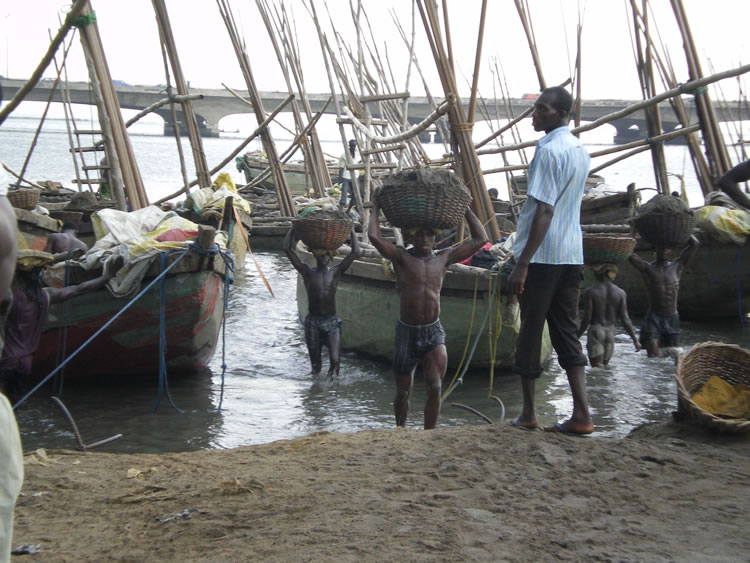
Many of their members flocked around the DDH team and tried to reply to allegations from state officials which accused them of digging for sand around the Third Mainland Bridge. They refuted the allegation vigorously, saying where they scoop sand from is many miles far offshore, mid-stream and without any signs of infrastructure or human habitation.
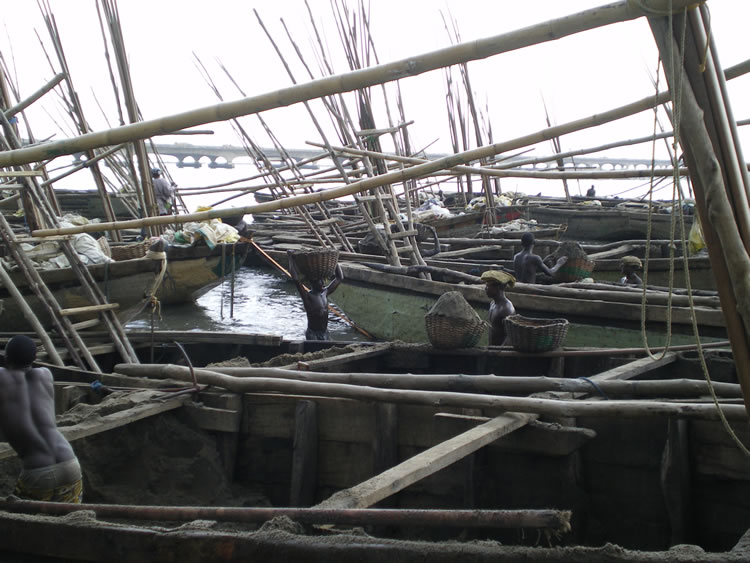
Rigorous personnel management is at the root of their successful business which is now, according to the secretary’s account, in its second to third generation. The boats are owned by the members of the society which operates like a syndicate, a cabal. Each boat is constructed at a cost of about N300,000.00 ($2,500 approx.). The boats are worked on the water for sand mining by various categories of skilled and semi-skilled artisans. There is a special category of workers which work at the burrow pit, as sand loaders. These are Eguns, who hail mostly from neighbouring Benin Republic. They are paid about N4,500.00 to fill each boat. The boatmen have their jobs cut out for them also: Once the boat is filled with sand, they are to bring her to shore safely. Again, once docked, off-loaders take over and empty the sand into stockpiles according to their owners. These shore-based workers are also paid differently. Other loaders are responsible for loading the trucks that come to buy the sand. And as one of the members of the association intimated the magazine, the truck drivers are connected to the syndicate. Some of the trucks are owned by the association’s members.
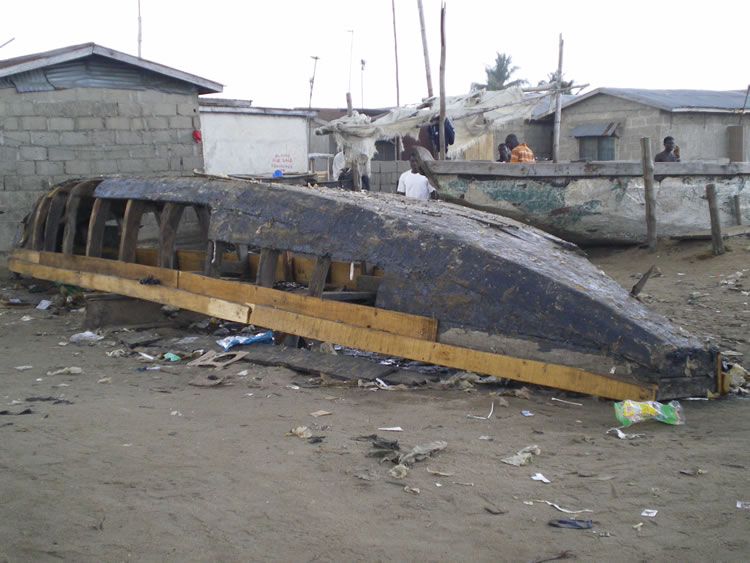
Ownership of boats among the members varies from one to two or even up to four. The larger numbers may be owned by families. This is largely a family-based business as outsiders do not seem to be able to integrate into their network and dynamics. The secretary told us that their fathers came to that piece of land in the 1960s and started using it as part-owned and part-leased from the original land owners. He said the land used to belong to the Nigerian Ports Authority (NPA) as part of the Lagos Ports Complex. The NPA had given them a title to use the land according to him, and they have got documents to prove this. He told us that the land where we were standing to record the interview was actually a reclaimed land by their forefathers.
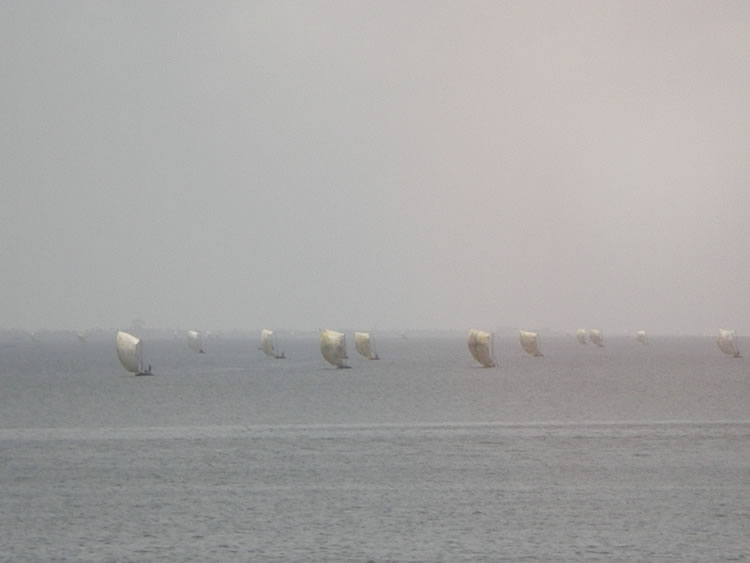
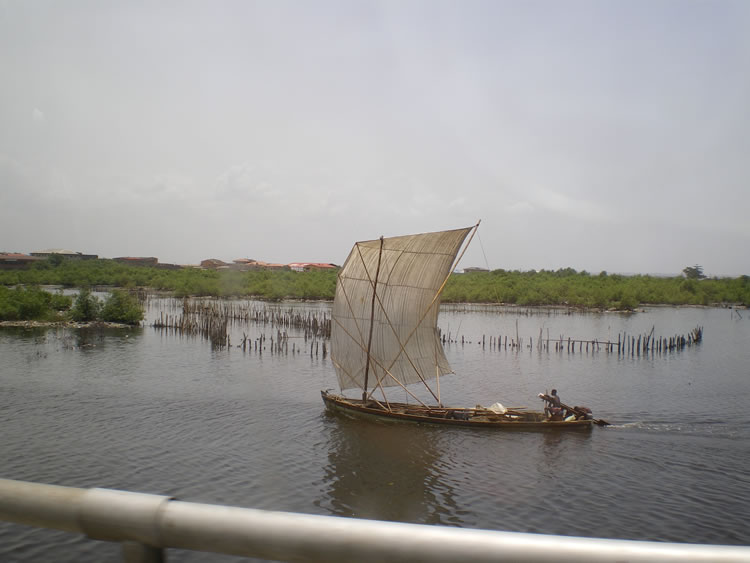
The economy of this part of town is largely based on this level of artisanal sand mining and by far this is the largest community of artisanal sand miners the magazine has so far encountered. Whether any of these sand dealers eventually metamorphose into dredging firms using dredgers is not known for sure. The association said the beach was divided into two sections manned by two groups of operators in this part of town. The Ifesowaso Associates puts their members’ fleet at about two hundred boats, with the likelihood of as many owner-members. Workers like loaders, boatmen, off-loaders and the truck drivers are unnumbered as yet, they do not belong to the club. But this place is seething with activity, and the magazine understood that their schedule is round the clock. This is because the boatmen have to set off in the evening, arrive their mining spots in the wee hours of morning and loading begins around 5 in the morning. By about 8 in the morning, the return journey sets sail. And the daily routine continues likewise in the other aspects of their operation. Apparently, the boat parties sail as a group, inadvertently giving onlookers a feeling of déjà vu on seeing Mungo Park-like voyages right on the Lagos lagoon. However, the security implications of this kind of movement cannot be easily discounted.
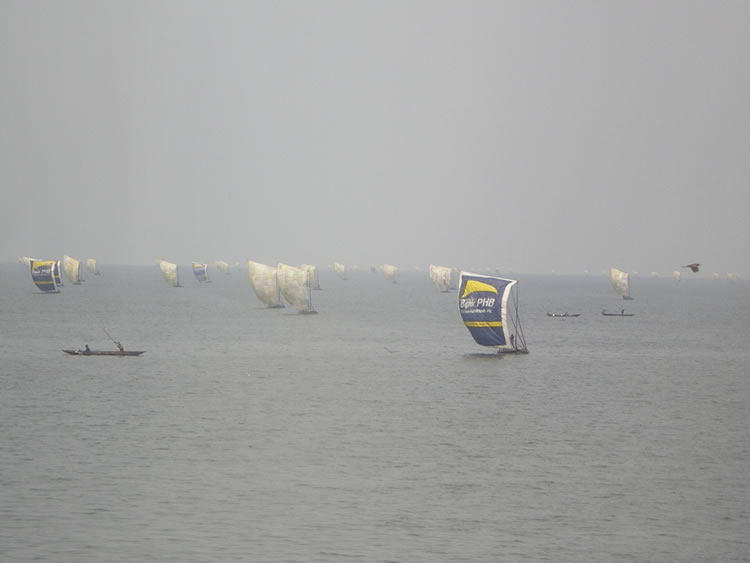
When DDH called on this people, the community seemed agitated by the new order which the Lagos State Government was putting in place to regulate all activities of dredging and sand mining in the state. The association’s secretary, James, decried an alleged move by the state government to turn all lands along the waterfront from Oyingbo to Bariga into recreation centres. He wondered how they and their families would fare as this is the only business and venue they have known for a livelihood as long as he could remember. Secondly, he wondered how they could be dispossessed since the land has been owned by their families for all these years. He swore that they would fight the move as they had done before. When the magazine asked him to expatiate, he said they had fought a similar case up to the Federal Court of Appeal in times past and won, stressing that they have documents to back up all their ownership claims.
The magazine has captured the mood at this waterfront in words and pictures. Here are excerpts of our interaction with James and his members. Mr Mina Monedi is the chairman of Ifesowaso and the two of them spoke to us together, answering the questions in unison or by interjection. The response has therefore been simply labeled as from “Ifesowapo”. Every effort has been made to retain the original words of the speakers, except in cases where editing was required for clarity. Excerpts:
DDH: Is your organization a registered one? Do you have a register of your own members?
Ifesowaso: We registered our own members into two categories, we have Ifesowapo and Irepodun.
DDH: What is the qualification to join your organization, to come here and be dredging sand?
Ifesowapo: We are manual workers, we are not dredging. The method we use to pack our own sand is digging manually, that is, we have labourers that are carrying the (sand). They will sail to Ikorodu area far away, about 20 kilometres from here, around Egbin, not too far from Epe. It’s around the vicinity of the NEPA (National Electric Power Authority) station.
DDH: But why do you want to go that far, does it mean there is no sand around here?
Ifesowaso: No sand, it’s so deep, it’s only [mechanized] dredging people that can find out whether there is sand under the depths. Also, because of this bridge (pointing to the nearby Third Mainland Bridge), we cannot dredge sand here because of this bridge. If we dredge sand here, it will affect the bridge. So, we have to go so far. And they (the labourers) use ladder, when they go inside the water, they will hold the digging bucket. After they dig with the bucket, they will climb up the ladder and drop the sand in the canoe. Until the boat is full, and they will sail back. They will go by evening time, around 6 or 7 in the evening, and when they reach there, they have to rest and when they rest for some hours. Around 5 o’clock in the morning, they will start digging, and dig for about two or three hours. When they finish digging, they will sail back.
DDH: By then, the boat is full?
Ifesowaso: Yes. When they reach here, the other labourers will start unloading the boat.
DDH: I see, another set of workers will do this?
Ifesowaso: Yes, another set of people. Even the people loading (offshore) are the Egun people from Cotonou ( Benin Republic). The off-loaders are Yorubas and other small boys, Ilaje, etc.
DDH: That means that the man scooping the sand from the river, you have to pay him?
Ifesowaso: We pay them not small money. The money here is N4,400.00 (about $40) for loading a full boat.
DDH: Does the boat have measurement?
Ifesowaso: Yes, it’s equal to 10 cubic yard (two tipper lorries). Some are not up to but that is the average.
DDH: Are all the boats of the same size?
Ifesowaso: Not of the same size but most of the boats are two tippers and the others are almost that size.
DDH: So the man loading will be paid…?
Ifesowaso: N4,400.00 while the dischargers (off-loaders) will be paid between N1,500.00 – N1,800.00 (between $12 -$14).
DDH: So who is the owner of this sand?
Ifesowaso: We are not the owners, those of us who are members of the association. We have different boats, each member. We have over two hundred boats here between us.
DDH: The surprise is that so much sand can be produced without dredgers…?
Ifesowaso: The dredgers are apart, they use mechanical but we are using hand to dig.
DDH: But do some of you aspire to buy dredger?
Ifesowaso: (There was a round of laughter before the chairman made bold to answer) Without support from the government….especially when they are saying they don’t need it….
DDH: Are you satisfied this way?
Ifesowaso: But our loaders and off-loaders will be jobless, because they have learned this job from the beginning.
DDH: How long have you been in this business?
Ifesowaso: Right from the 1960s…
DDH: You mentioned during the meeting with the Lagos State Ministry of the Waterfront Infrastructure Development that your organization used to pay fees to one organization. Can you give the history of such payments and the organizations?
Ifesowaso: We paid first to the local government. Personally, I started 1970 here in this beach but our fathers had started earlier before that. That is what he is quoting to be 1960 (referring to one of their members). We paid to the so-called land lords who claimed to be the owners of the land. It’s agreement (fees) we paid to them, and buy some parts. In some cases, we annually pay them. We paid to the local government. Formerly here, we were paying to the Shomolu local government but in later years, we paid to the Bariga local government because Bariga local government had been carved out of Shomolu local government. We paid to the Lagos State Government. The departments in Lagos State Ministries that are collecting this money from us are three, whom are struggling for it. First was Ministry of Agriculture and Cooperatives (Forestry Department); Ministry of Environment and Physical Planning and that is LASEPA, they come to us through LASEPA. And later, in the last regime, these people came out, Office of the Special Adviser to the Governor on Mineral Resources, Honourable Senayo. It was his department we paid to in the Governor’s Office. We have all these documents. And now, Lagos State Ministry of Waterfront is also coming. But the surprise we are having now, that we want all Nigerians to hear of is that this Commissioner (for Waterfront Infrastructure Development) says that all matters about minerals in Lagos State ends on his table. That’s what he said, you were there also. But we are saying there are federal enactments in this country. There is a federal government, there is state and there is local government. Three tiers of government are there. So, the local government cannot say the state government is nowhere. And the state government cannot say that federal government is nowhere. We have been dealing with federal government. We went to court on this land, this beach, up to Court of Appeal. We won on the ground that this place belongs to the federal government.
DDH: Is that the case?
Ifesowaso: Yes, we have the letter. Somebody took us to court claiming ownership of this foreshore line; especially this our area, we reclaimed it. All this places were water, we reclaimed it. But according to a paper being passed around the day we held a meeting with the Commissioner, they were saying that any person that reclaims land or that wants to reclaim land is risking himself. But Nigerian Ports Authority (NPA) under the Federal Ministry of Transport has authorized us to reclaim here and we did. We have the documents from them.
DDH: In what year was that?
Ifesowaso: That was 1984.
DDH: You said NPA authorized you. What concerns NPA to authorize you people on a matter of this beach?
Ifesowaso: This place is under the Port of Lagos, NPA. There is an enactment of the federal government (on it). But now a parastatal under Federal Ministry of Transport called NIWA (National Inland Waterways Authority) has overtaken that portion because they are all under Federal Ministry of Transport. The enactment has carved out some areas out of NPA’s (jurisdiction) including where we are standing today. And from 1997, they had come to us to regularize ourselves with them and we pay annually to NIWA on temporary occupation (basis). But when the commissioner was talking, he said all federal enactments in this state has nothing to do, but we are Nigerians. When time comes, we all know where we are going. Now, we are crying out to government for assistance, that we should not be carried away, we are Nigerians. Where do they want to drive us to?
DDH: What are you people doing as a final resort?
Ifesowaso: We are waiting to see… For example, I went to a meeting yesterday of the Urban Dwellers Forum. While there, an information said that Lagos State Government has announced that they want make from Oyingbo to Oworonsoki a recreation centre by the lagoon, by the beach line. I want them to consider those of us by the lagoon. I am sure they cannot do that with the University of Lagos. So, why do they want to do it to us, is it because we are individuals? We will cry out when the time comes.
DDH: How is the carpentry aspect of the business?
Ifesowaso: This is our occupation. Our fathers based on this occupation. This one is being repaired but this is a new one (pointing to two boats in various stages of completion.
DDH: So there are people who start this boat here and complete it right here?
Ifesowaso: Yes, at least, a week or two weeks, they finish it, when there’s money.
DDH: How much does it take to build a new boat like that?
Ifesowaso: About N300,000.00 (about $2,500 US), because building materials are now very costly. Aluminum zinc now, only one of about 10 metres is now N10,000.00 and we are going to use about 40 pieces. This pan is used to cover the boat (under girding).
DDH: So this a complete business chain, everything you need is here. You get the wood from the nearby wood market?
Ifesowaso: Yes.
DDH: What kind of wood is used?
Ifesowaso: Black afraa, you cannot use just any wood; you know you are going to the middle of the lagoon….
Editor’s note: This feature was first published in print in the 2nd Qtr 2008 edition of DDH Magazine.
